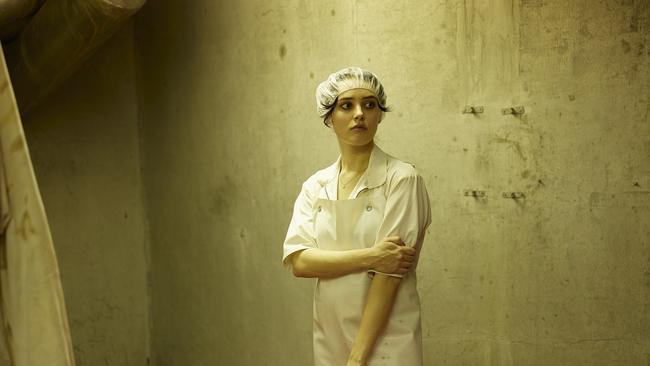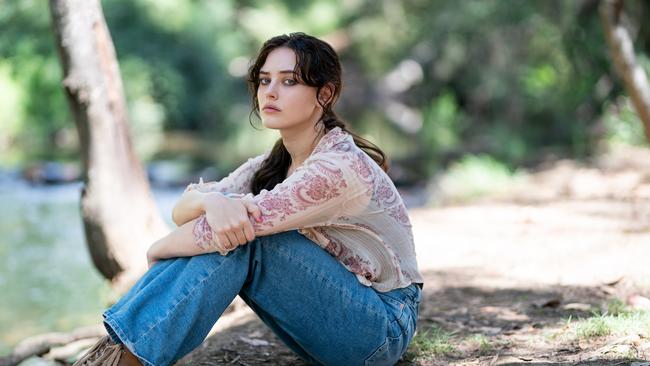Small-town mystery Savage River is slow to flow
Despite an impressive cast and elegant direction, Savage River lacks the surprise factor.

Small-town murder mysteries have become a staple of the viewing universe both in Britain – Broadchurch, Hinterland and Shetland – and in the US, where Twin Peaks, about the murder of a homecoming queen, remains a cult classic. In more recent times we’ve watched lives spiral out of control in True Detective, Fargo, Mare of Easttown and Stranger Things. And gloomy Nordic noir really arrived with Wallander, about the middle-aged Swedish detective working the badlands of Skane county, just over the sea bridge from Denmark and the rest of Europe.
They’re really stories about community, family, faith, belief, fear and our relationship to death and grief, the engine of the whodunit taking us through the tragedies of people’s lives.
Small towns are ideal for stories in which people know their neighbours – and each other’s business – which can be both comforting and claustrophobic.
Characters become solid, rooted in the landscape, linked to what British crime writer Ann Cleeves calls “the kind of psychological archaeology that digs into the past to explain family rivalries and tensions”.
Savage River is the latest ABC drama and it’s also about a small rural township’s anxieties and preoccupations, a fertile place for a murderer to grow.
Created by Belinda Bradley, Franz Docherty, and Giula Sandler, the series is produced by Angie Fielder and Polly Staniford for Aquarius Films, an innovative company whose TV shows include romantic drama series Love Me and miniseries The Unusual Suspects.
The director is Jocelyn Moorhouse, not only an accomplished creator of movies such as The Dressmaker and the 1991 classic Proof, but who in recent times has shown a versatile edge as a set-up director of prestige TV, in series such as the kaleidoscopic Stateless, the pulpish country noir Wanted and the knockabout comedy of Les Norton.
She was also involved in the brilliant small town psychological mystery Wakefield, set at a facility perched on the edge of the spectacular Blue Mountains with their imposing rocky precipices, endless primordial eucalypt forests and lush valleys. And some very broken people.
Her director of photography is the legendary Don McAlpine, one of Australia’s great feature film cinematographers, responsible for more than 50 films including Puberty Blues, Moulin Rouge! and X-Men Origins: Wolverine. This is only his second local TV production following his work on Jeffrey Walker’s Lambs of God some years back, and again it’s a wonderful, if understated, example of the aesthetic renaissance in television drama, using visual and narrative techniques commonly used in film.
Few know lenses, composition, lighting, colour and camera movement like McAlpine but you always sense he never loses sight of the play, serving the character and the scene at the same emotional and dramatic level as the director.
Savage River is a small township with little more than a pub and a chemist. The town is built around a sprawling meatworks, the subject of great controversy among the locals, and largely staffed by Muslim Afghan refugee workers.
Australian regional towns increasingly face a declining working-age population, low unemployment and shrinking services, so the newcomers quickly and conveniently become part of the local workforce.
There is an election coming up, and the fate of the meatworks is a central issue with the town’s greenies worried about their river and its proximity to the slaughter house. “Meat Is Murder” is painted on the benches at bus stops around town.
A bus brings Miki Anderson (Katherine Langford) back to her hometown after 10 suffocating years in prison. She was incarcerated at age 16 for the accidental killing of her best friend, Jasmine. She’s obviously a loner, driven by peculiar and personal obsessions, and having spent much of her adolescence within the confines of a prison cell she’s both streetwise and ingenuous; she knows how to look after herself physically but can’t drive a car. Men confuse her. As much as she wants to move on with her life, there’s little doubt from the start that the locals will not make it easy for her. Nor will her somewhat intractable disposition, her sense of disconnectedness and apprehensiveness associated with exiting into an unknown future with few personal resources.
Her twin brother Terry (Cooper van Grootel) still lives in town, single father to his daughter Ocean. While he stood by his sister when she was convicted, he succumbed to small-town addiction while trying to cope with the anger surrounding him. He survived the drugs and booze and is now the postman and studying law.
Desperate for work, Miki is quickly guided to the meatworks, owned by the dodgy Kevin Patterson (Daniel Henshaw), the company in his family for generations. Kevin is renowned for hiring refugee workers because they’re cheap and easily exploited. The meatworks pays less than award rates and charges an excessive amount in accommodation costs. And Kevin wants to quit; there appears to be a sale in the wind, even though the meatworks is the livelihood of the town.
There is a complication. One of the refugee workers, Laila, is missing, her family worried about her whereabouts. Then Miki finds herself in trouble too.
Langford is good as Miki, though perhaps plays the obdurateness a bit too dourly. The supporting cast – including Jacqueline McKenzie and Nadine Garner – are authentic and believable. And Mystery Road: Origin’s Mark Coles Smith, as the handsome, swaggering Joel Thorpe, walks away with every scene in which he appears. Drawn to Miki, he offers support, unswayed by the gossip and misogynistic malice.

While it’s directed with elegance and mood, McAlpine’s photography often working in lovely creeping, subjective close-ups, Savage River is simply too slow to start. It’s the kind of thriller which, as the great crime writer Eric Ambler suggested, is “an extension of the fairy tale; it is melodrama so embellished as to create the illusion the story being told is true”.
We’re given a slow-burning puzzle of a character, at least to begin with, that looks – after a lot of somewhat tedious mooching around the township – like it will obviously turn into a police investigation involving time, place, motive and opportunity.
But these days, with so much high-end drama coming at us at an almost alarming rate, reinventing genres constantly, episodes must capture us with a tantalising opening, a constantly surprising middle and a fulfilling ending.
“It’s always a conscious choice to surprise people,” Breaking Bad and Better Call Saul’s Vince Gilligan says. “That is always the mandate. Today, with all the wonderful – and sometimes not so wonderful – entertainment it’s harder than ever to keep things interesting, so you have to surprise people.”
Savage River simply lacks enough suspense. This doesn’t mean menace necessarily or that the participants should be threatened by personal danger. There is some conflict – moments of intransigence, and the sense of worker exploitation that must lead somewhere as the story develops – but it’s too understated, and the show is short of narrative colour, lift and dash.
And the plotting is not baffling enough. There is a long-winded assembling of minute circumstances which we really can’t be expected to remember three weeks later when the denouement finally comes around. (I was a bit worried about the 11 “story consultants” mentioned in the end credits. That’s a lot of voices and notes for the show’s writers to contend with.)
As Raymond Chandler said of novels that do this to the reader: “To expect him to remember a thousand trivialities and from them to select those that are decisive is as unfair as to expect him to have a profound knowledge of chemistry, metallurgy, or the mating habits of the Patagonian anteater.”
The show’s writers do give us that sense of the story as a kind of iceberg, most of its substance invisible beneath the surface. We have no idea what happened in the past or why Miki went to jail – until suddenly after a long set-up we come to something unforeseen. It’s a long time to wait.
It’s obvious that bad things will happen to Miki and their exploration is something she has let herself in for – and she can’t elect out.
Savage River, Sunday, ABC, 8.30pm.




To join the conversation, please log in. Don't have an account? Register
Join the conversation, you are commenting as Logout